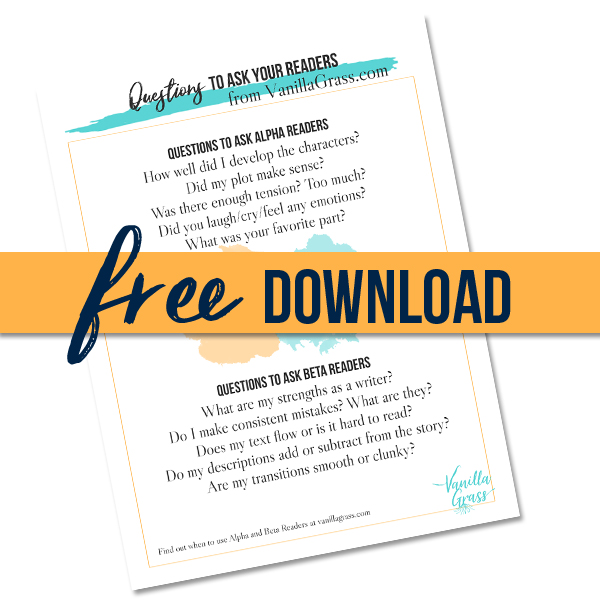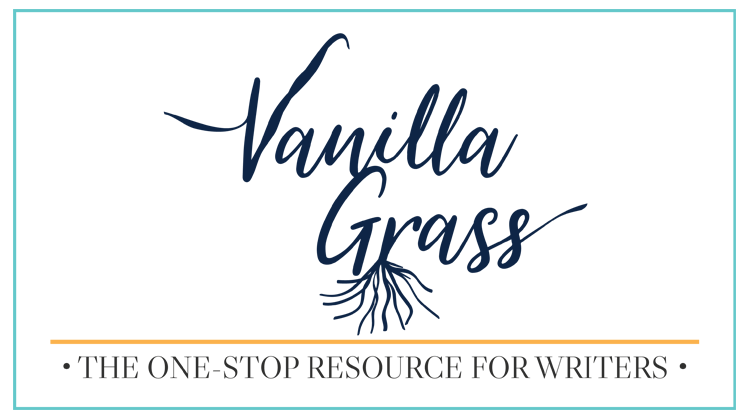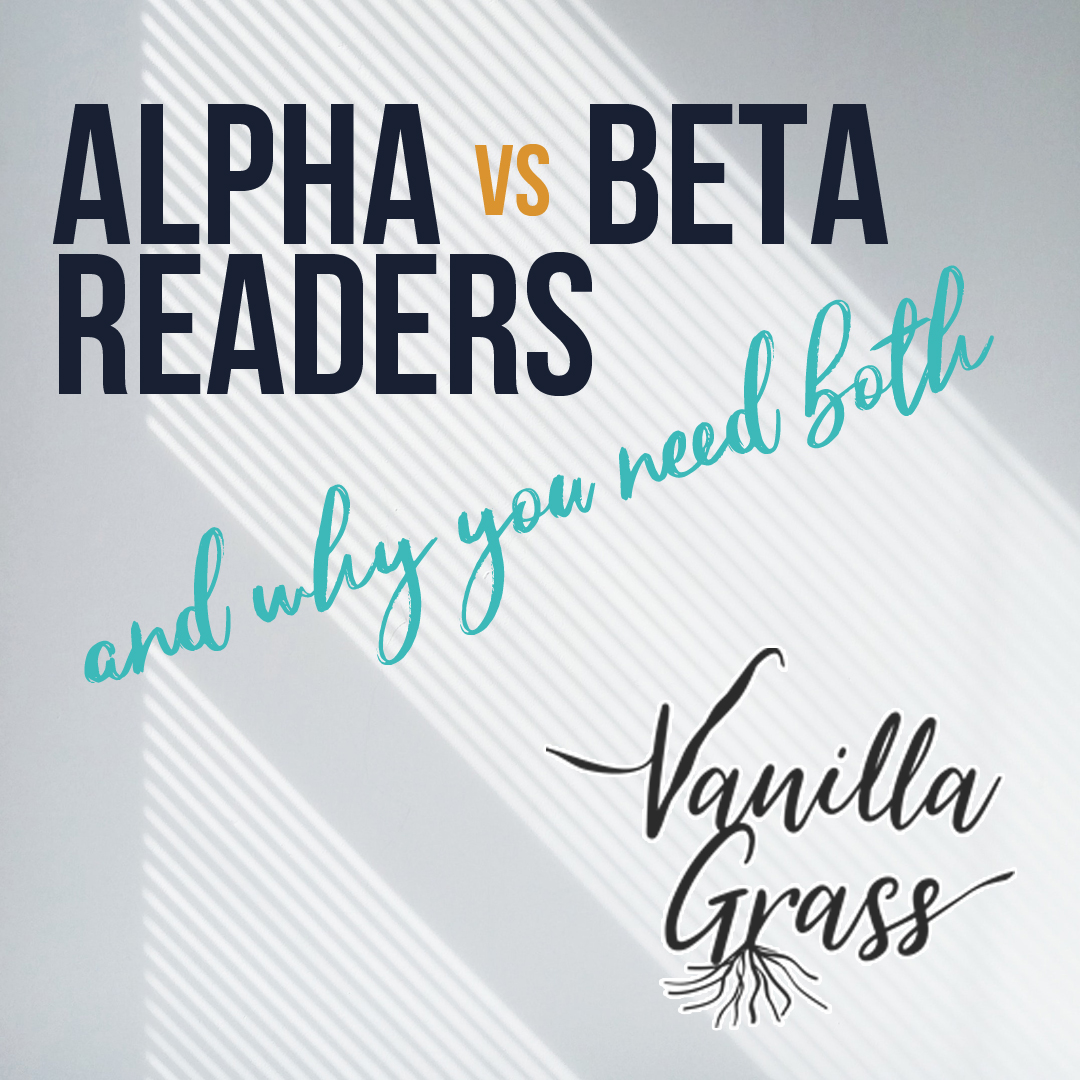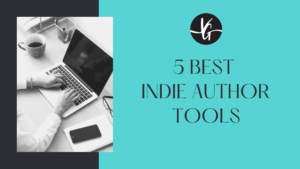Writers need Critiques
Have you ever poured your heart and soul into a chapter or an entire manuscript and have someone rip it to shreds? As much as it hurts, critiques are a part of writing. Keep reading to find out the reasons why you need alpha and beta readers and how you can actively promote more helpful critiques.

Also, I’ll share below an experiment I tried with Alpha readers that yielded incredible results.
Every author writes differently. For example, some like to get help early and polish off one paragraph, page, or chapter at a time, while others write a whole book before they share anything. The correct choice is what works for you, your book, and your current situation.
I’ve honestly tried multiple ways, and I will discuss the pros and cons I’ve run into at various stages of writing. Regardless of which paths you choose, every writer needs multiple sets of eyes.
Why?
First of all, getting the ideas and concepts out of our head and onto paper is much more complicated than simply typing or putting pen to paper. When a person sits down to write their first story, they often think it’s going to be amazing because their idea is unique and they’ve read a million books. They speak, they write–they should be able to create a book.

However, do you want to have heart surgery from a person who’s only sliced open a frog, has had an operation, and has watched all fifteen seasons of E.R.?
Me neither.
Just because you’ve read good stories, it doesn’t mean you can write one. But you WILL improve if you get proper feedback. The trick is to use the right type of reader at the right time.
Alpha vs Beta Readers

Have you ever grown a plant from seed? What would happen if you skipped the prepping-the-soil phase and instead, threw the seed on the ground? Or what if you didn’t plant the seed at all and just watered the dirt?
I’m pretty sure you’re not going to get the outcome you wanted.
With this in mind, the same principles apply to feedback on your writing. There’s an order to things that, if followed, will improve your writing. (But sometimes you should break the rules and I’ll explain this later).

As an illustration, consider a woodcarver. He cuts large chunks first to get the general shape. Once the shape is the best it can possibly be, the master adds finer details with more precise tools. If he focused on the finer details first, the carving of a flamingo might turn out more like a warthog.
You don’t want to make the same mistakes when writing your books.
If you’ve studied Greek history or mythology, chances are you’ve come across their alphabet: alpha, beta, gamma, delta, etc. When you’ve finished writing a book or chapter, you should ask for alpha readers first (usually).
Keep reading and I'll explain when to break this advice.
Why You Need Alpha Readers
When you’re ready for another set of eyes on your work, use alpha readers to critique the big picture. Think character development, plots, subplots, tension, flow.
An alpha reader turns a blind eye to grammatical mistakes, poor word choices, and sub-par prose. They focus on the heart of the story–the themes and questions you’ve posed. They can tell you if the story makes sense, and if it’s compelling enough to keep turning the pages.
Any person can be an alpha reader: your mom, Sally Jo down the street, your friendly neighborhood librarian, or members of your writing group can all help.

Now that you have an understanding of alpha readers, we can move on to the next step.
Why You Need Beta Readers
When your plot is void of holes and your characters are well-suited for the story, it’s time to sharpen your writing. Beta readers should look for the nitty-gritty of sentence structure, word choices, slip-ups in POV, lacking/incorrect emotions, etc.
Imagine your beta readers as knights, clad in armor and wielding red-inked pens. A knowledgeable beta reader can help guide you to see repeating errors and catch all those instances where you put a “the” next to another “the,” or wrote me instead of my (“Do you like me boots?”). They can also spot homophones like this one: “He put his arms around her waste.”
Ew. Gross.
You meant to say “He put his arms around her waist,” and a beta reader can catch that for you.
Who can be a beta reader? The same person who gave you feedback as an alpha reader can also give you more technical help. But it’s not wise to ask someone to do an alpha-read and beta-read at the same time.

Going back to the surgeon anaology, you don’t want her to sign all of the forms while she’s operating on your heart. Sure, you need her to fill out the forms and perform the surgery, but if she’s doing both tasks simultaneously, she’s bound to get distracted.
You don’t want your reader so knee-deep in comma abuse that they fail to miss the beauty of your masterfully crafted plot.
When to Use Alpha and Beta Readers?
You’re probably thinking, “Duh, you already told me when to use Alpha and Beta readers. Use the Alphas first, the beta’s next.”
That is the correct answer when you’ve reached the point when you’re classified as a “good writer.”
For me, I reached that point when I sat down with Dr. Uwe Stender of Triada US Literary Agency (he’s amazing, btw) for a query consult at a Storymaker’s writing conference. He complimented my writing skills and even requested a full that day!
But the years before that meeting, my writing wasn’t stellar. I kept making the mistake of writing an entire novel with sub-par grammar and trading with others for help. I burned out my readers and received too many points of critique that I struggled with understanding where to focus.
If your readers aren’t expressing their love for your ability to craft sentences and paragraphs that are logical and flow, alpha readers might not be helpful yet. When they struggle to make it through your book or chapter because they get hung up with grammar, they might get too distracted to see the big picture.
That’s why sometimes you have to use beta readers on short blocks of text to improve your prose.
Simple Ways to Improve:
- Focus on the art of writing.
- Learn how to be clear and concise.
- Learn about transitions.
- Study the mechanics in your favorite stories.
- Join a critique group and share a few pages. LISTEN to what the other writers have to say.
- Share the same pages with non-writers, then LISTEN.
- Write something other than the story tugging on your heart that you’re less passionate about and ask for help.
- Be willing to give help in return. You can learn much from other’s successes and mistakes.
- Learn more about story structure.
- Use our free plot graph to make sure your story has enough steam to make it to “The End.”
Are Readers Always Right?

Definitely not.
I’ve had readers tell me my rough drafts were amazing (when they weren’t). And I’ve had the opposite when a reader tells me my months of hard work were worthless (when they weren’t).
Some of my readers have been successful, published authors, but not all advice has been relevant. Some of it was even horribly, grammatically wrong.
Writers have good days and bad days and we’ve been told different things through conferences and craft books and critiques. Our wells of knowledge and our garbage piles come with us every time we read for someone else.
That’s why I like to use multiple readers at a time. If I get the same feedback from the majority of my readers, I’ll make changes. If I have critiques that require drastic changes that only come from one person out of a sea of five-ten, then I usually toss that advice.
Another helpful tool is to understand the strengths and weaknesses of your readers. Offer to beta read for them first. Not only will you gauge their quality and learn from their successes and mistakes, but you’ll make for a good writing friend.
At Vanilla Grass, we believe the writing community is essential for the life of a writer, so making friends with other authors is a crucial task. The more helpful you are to others, the more they’ll be willing to help you in return.
Once I find other writers with similar skills to mine, I then learn to ask the right questions.
The Questions to Ask
Don’t ask, “Will you read my book and give me feedback?” This question is far too vague. Pinpoint what you need and let your readers know.
Sample Questions to ask Alpha Readers:
- How well did I develop the characters?
- Did my plot make sense?
- Was there enough tension? Too much?
- Did you laugh/cry/feel any emotions?
- What was your favorite part?
Sample Questions to ask Beta Readers:
- What are my strengths as a writer?
- Do I make consistent mistakes? What are they?
- Does my text flow or is it hard to read?
- Do my descriptions add or subtract from the story?
- Are my transitions smooth or clunky?
An Alpha Reader Experiment

Earlier this year, I polished off my first chapter of a YA romance. I had a pretty good idea of where I wanted the story to go, but I didn’t want to fall in some of the writing traps I’d encountered on previous books. I wanted to try something different.
So I asked on social media, and point-blank through text, if my friends would be willing to read my chapter and leave me anonymous feedback through a Google Survey.
Everyone I asked agreed they could read a single chapter. I put the chapter on a Google Doc, gave them access, and linked to my survey at the end of the chapter. I asked four simple multiple-choice questions.
Alpha Reader Survey:
- On a scale from one-ten, please rate your interest level in this chapter.
- Ten – I might die if I never get to read the rest of this book.
- Nine
- Eight
- Seven
- Six
- Five – I’d be okay to read more. Or not. It doesn’t matter.
- Four
- Three
- Two:
- One -This is abysmal and I would never read more.
- What are your thoughts about 1st person novels (i.e. I went to the store instead of she went to the store)?
- I’m indifferent.
- I love them.
- I hate them.
- You’re in a bookstore with a gift card and ten hours to kill. You can only pick one book. How likely are you to pick up a Young Adult novel?
- Ten – My heart beats for teen drama.
- Nine
- Eight
- Seven
- Six
- Five
- Four
- Three
- Two:
- One – No way in heck.
- You’re still in the bookstore. On a scale from one to ten, how likely are you to pick up a contemporary romance?
- Ten – Bring on the kissing scenes.
- Nine
- Eight
- Seven
- Six
- Five
- Four
- Three
- Two:
- One – Romance? Ew, gross.
The Responses:
The responses to these questions were revelatory. For so long, I had bent to the critiques of every reader. But many of my readers in the past hadn’t liked my genre, or the first-person point-of-view that I usually use.
The survey helped me see that the single person that gave me a three out of ten for interest (the lowest score) also said they didn’t like romances, and they weren’t too fond of YA stories. All of the people who marked YA and romance in the positive ranges all gave nines or tens.
After the link for the survey, I added in two more chapters and another survey with the same questions, along with a link to more chapters. The readers who loved my genre and writing style asked to read more pages. I struggled to keep up with their demand.
Quickly, I wrote the story using the writing principles I had already mastered, running each chapter through Grammarly on a sprint to the finish. I posted chapters in bundles and within hours, survey responses came in. That told me even more–my book was a page-turner.
When I gave the readers the final chapters, I linked to one more survey with different multiple choice questions and comment boxes.
Final Survey Questions:
- How’s the writing quality?
- Did your interest level ever dip?
- Who are your favorite characters and why?
- How did I handle the tough subjects?
- Was the romance cheesy or just right?
- How’s the pace?
- How are the descriptions?
- What did you think about the big reveal?
- Was there anything you didn’t believe?
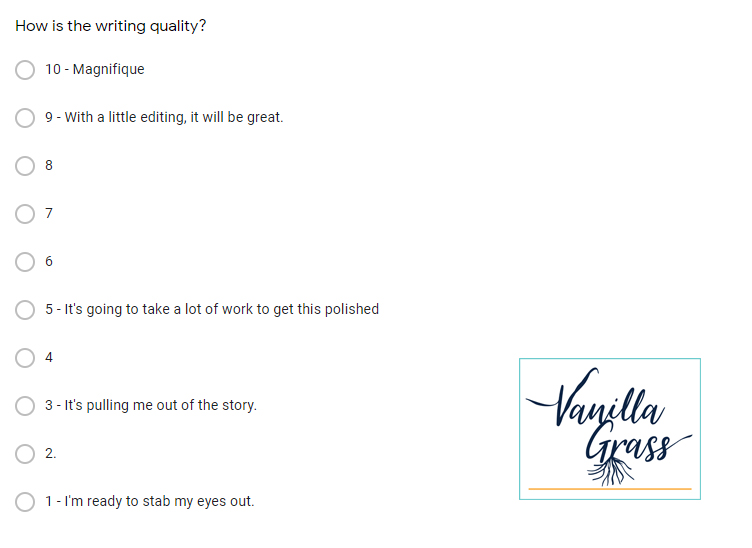
With a large pool of readers, I threw out any outliers and focused on the core responses. My readers told me exactly what I needed to hear at that point: I had a story worth querying (after edits).
In other words, I asked the right questions for the right stage of my book.
If I had asked for beta readers, they would have covered my pages with changes. My draft wasn’t ready for that. It also wasn’t horrible either. I had developed enough mechanics of writing clearly and effectively that my alpha readers could make it through to the end.
Again, I asked the right questions for the right stage of my book and got the answers I needed to move forward.
Processing Feedback
Carolyn and I could write chapters, volumes even, on the feedback we’ve gotten over the years. Some has been so helpful, while other critiques have left us questionning whether or not we should ever type another word.
If feedback makes you stop writing for a day, or weeks, or months, then it probably has some truth, but was given too harshly.
My advice is to listen to the parts that resonate, do some research, and write something new, at least for a day or two. Don’t let someone’s critique get you down.
You’re better than that.
You’re stronger than that.
The world needs your thoughts, ideas, and stories.

You now understand why you need alpha and beta readers, and you have the tools to get better critiques. So pick up that dang pencil or bust out your laptop and get to work. Your writing will improve, and you’ll reach the goals you’ve set for yourself. And check out our handout on our downloads page.
